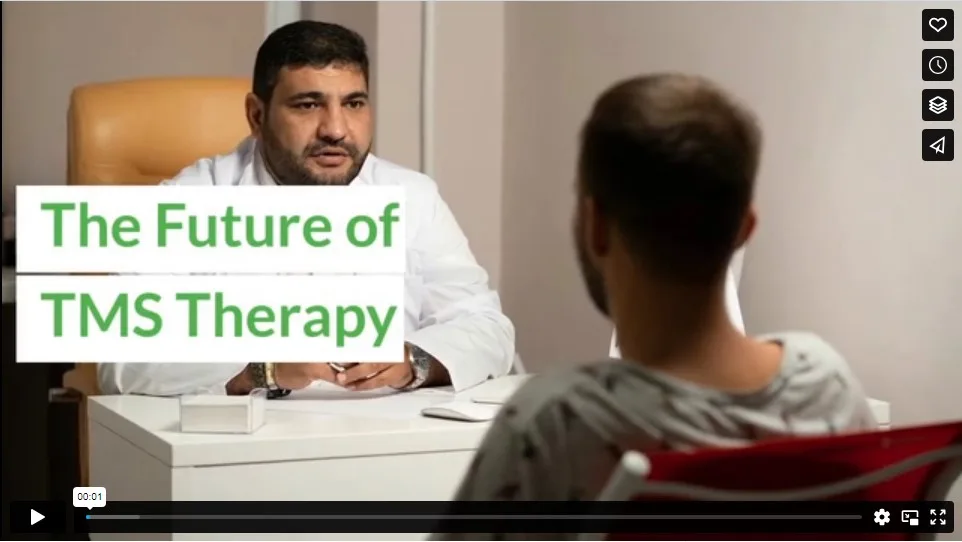The FDA cleared transcranial magnetic stimulation (TMS) as a treatment for major depression disorder (MDD) in 2008. Four years later (2012), Europe approved it for treatment. In 2018, the FDA cleared its use to treat obsessive-compulsive disorder (OCD). As technology evolves and more studies on the benefits of TMS therapy, TMS treatments will become more widely used and accepted by medical providers and patients.
For example, Stanford Accelerated Intelligent Neuromodulation Therapy (SAINT) is an accelerated TMS treatment which uses functional brain imaging for more targeted and specialized therapy. The FDA approved one form of SAINT TMS that will be available for clinical practice in 2023. Several studies about the various applications of TMS are also going on. Currently, experts are actively studying the effectiveness of TMS under the following conditions:
1. Schizophrenia
Schizophrenia is one of the most complex psychotic disorders, consisting of positive and negative symptoms. Delusions and hallucinations, the positive symptoms, respond relatively well to pharmacological treatment, but the negative symptoms persist. These consist of alogia or not speaking much, apathy, social withdrawal, and a flat affect.
These negative symptoms are strongly associated with lower daily functioning, poor prognosis over time, and more treatment resistance. A 2022 meta-analysis found that TMS was superior to the sham treatment for alleviating negative symptoms for both schizophrenia and schizoaffective disorder. Furthermore, the results suggested that the magnetic stimulation from TMS increased activity in the left dorsolateral prefrontal cortex (L-DLPFC), which was the key to reducing negative symptoms. This provides another focus of future research for more targeted TMS.
2. Migraines
At least 39 million people live with migraines. While specific migraine and pain medications can dull the effects, there are very few effective cures. Many suffering from debilitating headaches resort to botox, acupuncture, and daith piercings for some relief. A 2017 meta-analysis of randomized control trials established that TMS is an effective treatment for acute migraines with auras.
A study in the American Journal of Physical Medicine and Rehabilitation discusses that TMS can also treat chronic migraines, reducing pain severity and frequency by up to eight days per month. When a 2021 study used TMS as a prophylactic or preventative treatment for migraines, it reduced the overall episodes, the duration, and the pain associated with migraines when they did occur.
3. Alzheimer’s Disease
The most common form of dementia, Alzheimer’s, is a progressive degenerative memory brain disease that leaves patients incapacitated and leads to a confusing, prolonged, and difficult death. Current pharmacological treatments offer minute symptomatic relief without altering the underlying progression of the disease. An early study in 2014 suggested that TMS can enhance cognitive performance impaired by Alzheimer’s.
A 2020 literature review discusses how TMS has improved various cognitive impairments and functions associated with mild to moderate Alzheimer’s, but researchers couldn’t measure their lasting effects as the disease progressed. More research needs to be conducted on early screening and appropriate diagnosis between Alzheimer’s and other memory diseases to examine the positive effects of TMS therapy thoroughly.
4. Bipolar Disorder
Like schizophrenia, bipolar disorder is challenging to treat because of its unique mixture of symptoms. On one side, there is depression and everything that is associated with that disorder. However, suppose you treat depression with just an antidepressant. In that case, it will trigger a manic episode accompanied by a euphoric mood, endless energy, insomnia, grandiosity, risk-taking, and racing and sporadic thoughts or speech.
Typically, treatment consists of an antidepressant and a mood stabilizer. The most effective is lithium which requires close monitoring as it can slowly poison you. Unfortunately, most medications to control your bipolar are not safe to be taken while pregnant, which can be hard to deal with in addition to your diagnosis.
In a 2019 review of clinical trials, Gold et al. note that most previous research has focused on TMS treating the depression of bipolar disorder, which occasionally has led to manic switching as antidepressant medication does. A literature review in 2020 goes further and suggests that TMS can produce meaningful reductions in both depression and manic symptoms associated with bipolar disorder. However, affective switching is still a risk, so further research is needed to verify the efficacy of TMS for bipolar disorder.
5. Smoking Cessation
Tobacco use is a significant public health issue, resulting in high economic costs and preventable deaths. Limited treatment options, such as psychotherapy and medications, have low efficacy. Recently, the FDA approved specific TMS methods for smoking cessation. Research in 2020 explained that a single session of TMS reduced cue-induced cravings. This double-blind, randomized control trial showed that active TMS treatment more than doubled the cessation rate and significantly reduced both consumption and cigarette craving. This is a considerable development and the first step towards TMS becoming a treatment in addiction medicine.
While the FDA hasn’t approved TMS for the clinical treatment of most of these disorders, it’s only a matter of time. Non-invasive, medication-free treatment is the gold standard and future of medicine, especially with neurological conditions. Stay tuned for more research and FDA clearances, especially as SAINT TMS rolls out.
Infographic
TMS, or transcranial magnetic stimulation, is a medical treatment approved by the FDA since 2008 for treating disorders like major depression and obsessive-compulsive disorder. As this incredible technology continues to evolve, its potential for helping those suffering from these conditions are incredibly promising. This infographic offers insights into current studies on the efficacy of TMS for treating specific ailments.

Video

